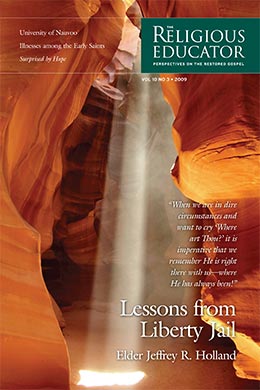Lessons from Liberty Jail
Jeffrey R. Holland
Elder Jeffrey R. Holland, “Lessons from Liberty Jail,” Religious Educator 10, no. 3 (2009): 1–16.
Elder Jeffrey R. Holland was a member of the Quorum of the Twelve Apostles when this was written.
This address is from a Church Educational System fireside for young adults on September 7, 2008, at Brigham Young University.
 Elder Jeffrey R. Holland. Intellectual Reserve, Inc.
Elder Jeffrey R. Holland. Intellectual Reserve, Inc.
My beloved young friends, it is a thrill for Sister Holland and for me to be with you tonight for this worldwide satellite broadcast. It’s always a thrill to be in the Marriott Center. I wish it were possible for us to be in each of your individual locations, seeing you personally and being able to shake your hands. We haven’t figured out a way to do that yet, but we send our love and greeting to all of you wherever you are in the world. In spite of the vastness of our global audience, we hope all of you are individually able to feel the love we have for you tonight and that each of you can gain something from our message that is applicable in your personal lives.
The Prophet in Liberty Jail
One of the great blessings of our assignments as General Authorities is the chance to visit members of the Church in various locations around the world and to glean from the history that our members have experienced across the globe. In that spirit I wish to share with you tonight some feelings that came to me during a Church assignment I had last spring when I was assigned to visit the Platte City stake in western Missouri, here in the United States.
The Platte City Missouri Stake lies adjacent to the Liberty Missouri Stake, now a very famous location in Church history encompassing several important Church history sites, including the ironically named Liberty Jail. From your study of Church history, you will all know something of the experience the Prophet Joseph Smith and his brethren had while imprisoned in that facility during the winter of 1838–39. This was a terribly difficult time in our history for the Church generally and certainly for the Prophet Joseph himself, who bore the brunt of the persecution in that period. Indeed, I daresay that until his martyrdom five and a half years later, there was no more burdensome time in Joseph’s life than this cruel, illegal, and unjustified incarceration in Liberty Jail.
Time does not permit a detailed discussion of the experiences that led up to this moment in Church history, but suffice it to say that problems of various kinds had been building ever since the Prophet Joseph had received a revelation in July of 1831 designating Missouri as the place “consecrated for the gathering of the saints” and the building up of “the city of Zion” (D&C 57:1, 2). By October of 1838, all-out war seemed inevitable between Mormon and non-Mormon forces confronting each other over these issues. After being driven from several of the counties in the western part of that state and under the presumption they had been invited to discuss ways of defusing the volatile situation that had developed, five leaders of the Church, including the Prophet Joseph, marching under a flag of truce, approached the camp of the Missouri militia near the small settlement of Far West, located in Caldwell County.
As it turned out, the flag of truce was meaningless, and the Church leaders were immediately put in chains and placed under heavy guard. The morning after this arrest, two more Latter-day Saint leaders, including the Prophet’s brother Hyrum, were taken prisoner, making a total of seven in captivity.
Injustice swiftly moved forward toward potential tragedy when a military “court” convened by officers of that militia ordered that Joseph Smith and the six other prisoners all be taken to the public square at Far West and summarily shot. To his eternal credit, Brigadier General Alexander Doniphan, an officer in the Missouri forces, boldly and courageously refused to carry out the inhumane, unjustifiable order. In a daring stand that could have brought him his own court-martial, he cried out against the commanding officer: “It is cold-blooded murder. I will not obey your order. . . . And if you execute these men, I will hold you responsible before an earthly tribunal, so help me God.”[1]
In showing such courage and integrity, Doniphan not only saved the lives of these seven men but endeared himself forever to Latter-day Saints in every generation.
Their execution averted, these seven Church leaders were marched on foot from Far West to Independence, then from Independence to Richmond. Parley P. Pratt was remanded to nearby Daviess County for trial there, and the other six prisoners, including Joseph and Hyrum, were sent to Liberty, the county seat of neighboring Clay County, to await trial there the next spring. They arrived in Liberty on December 1, 1838, just as winter was coming on.
The jail, one of the few and certainly one of the more forbidding of such structures in that region, was considered escape proof, and it probably was. It had two stories. The top or main floor was accessible to the outside world only by a single small, heavy door. In the middle of that floor was a trapdoor through which prisoners were then lowered into the lower floor or dungeon. The outside walls of the prison were of rough-hewn limestone two feet thick, with inside walls of 12-inch oak logs. These two walls were separated by a 12-inch space filled with loose rock. Combined, these walls made a formidable, virtually impenetrable barrier four feet thick.
In the dungeon the floor-to-ceiling height was barely six feet, and inasmuch as some of the men, including the Prophet Joseph, were over six feet tall, this meant that when standing they were constantly in a stooped position, and when lying it was mostly upon the rough, bare stones of the prison floor covered here and there by a bit of loose, dirty straw or an occasional dirty straw mat.
The food given to the prisoners was coarse and sometimes contaminated, so filthy that one of them said they “could not eat it until [they] were driven to it by hunger.”[2] On as many as four occasions they had poison administered to them in their food, making them so violently ill that for days they alternated between vomiting and a kind of delirium, not really caring whether they lived or died. In the Prophet Joseph’s letters, he spoke of the jail being a “hell, surrounded with demons . . . where we are compelled to hear nothing but blasphemous oaths, and witness a scene of blasphemy, and drunkenness and hypocrisy, and debaucheries of every description.”[3] “We have . . . not blankets sufficient to keep us warm,” he said, “and when we have a fire, we are obliged to have almost a constant smoke.”[4] “Our souls have been bowed down”[5] and “my nerve trembles from long confinement.”[6] “Pen, or tongue, or angels,” Joseph wrote, could not adequately describe “the malice of hell” that he suffered there.[7] And all of this occurred during what, by some accounts, was considered then the coldest winter on record in the state of Missouri.
It is not my purpose to make this a speech about the sorrow and difficulty these men confronted in Liberty Jail, so let me put a few photos on the screen and conclude this little introductory portion of my message. I promise I have something else in mind to say.
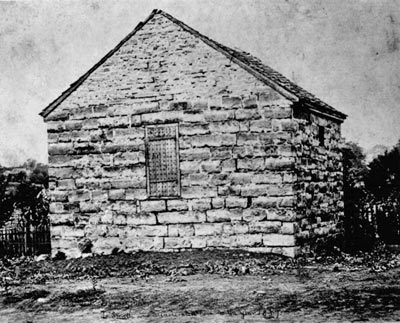 Here is a photo of the jail pretty much as it stood at the time Joseph and his brethren were incarcerated there.
Here is a photo of the jail pretty much as it stood at the time Joseph and his brethren were incarcerated there.
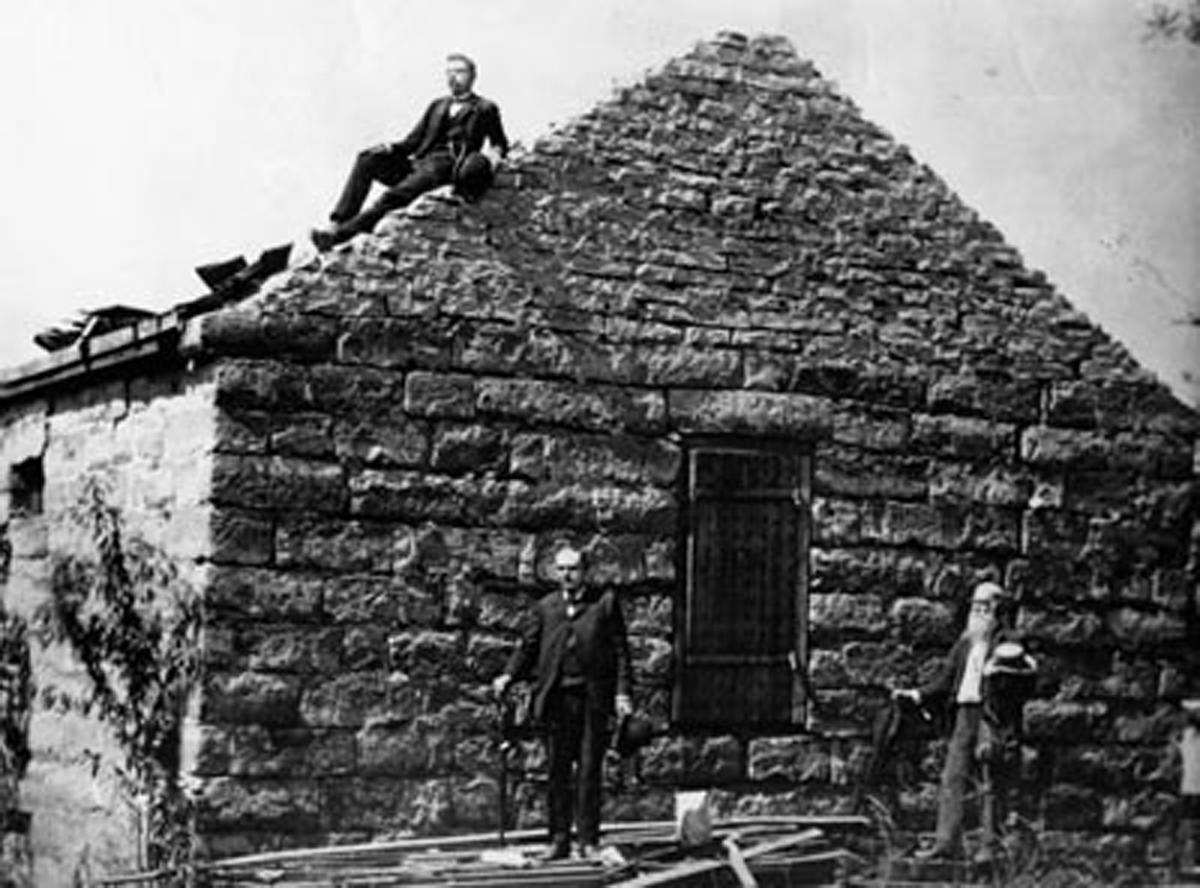 Here is a photo taken some years later when officers and historians from the Church visited the location. I’m not sure if that fellow on top is trying to get out or get in. Intellectual Reserve, Inc.
Here is a photo taken some years later when officers and historians from the Church visited the location. I’m not sure if that fellow on top is trying to get out or get in. Intellectual Reserve, Inc.
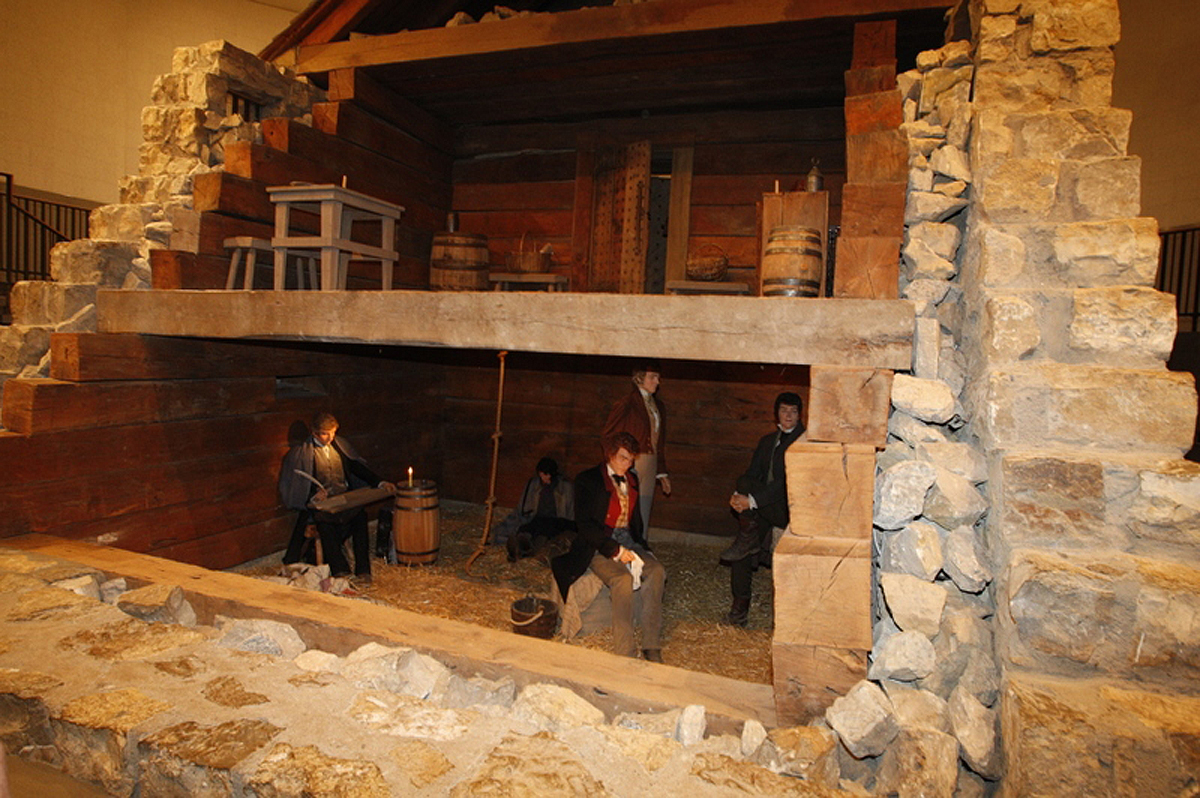 Here is a cross section of the Church’s reconstruction of the prison, which can now be seen at our visitors’ center there. Note the two-story arrangement with a rope and bucket, the only link between the dungeon and the upper floor. Photo by Mark Philbrick. BYU Photo 2007. All rights reserved.
Here is a cross section of the Church’s reconstruction of the prison, which can now be seen at our visitors’ center there. Note the two-story arrangement with a rope and bucket, the only link between the dungeon and the upper floor. Photo by Mark Philbrick. BYU Photo 2007. All rights reserved.
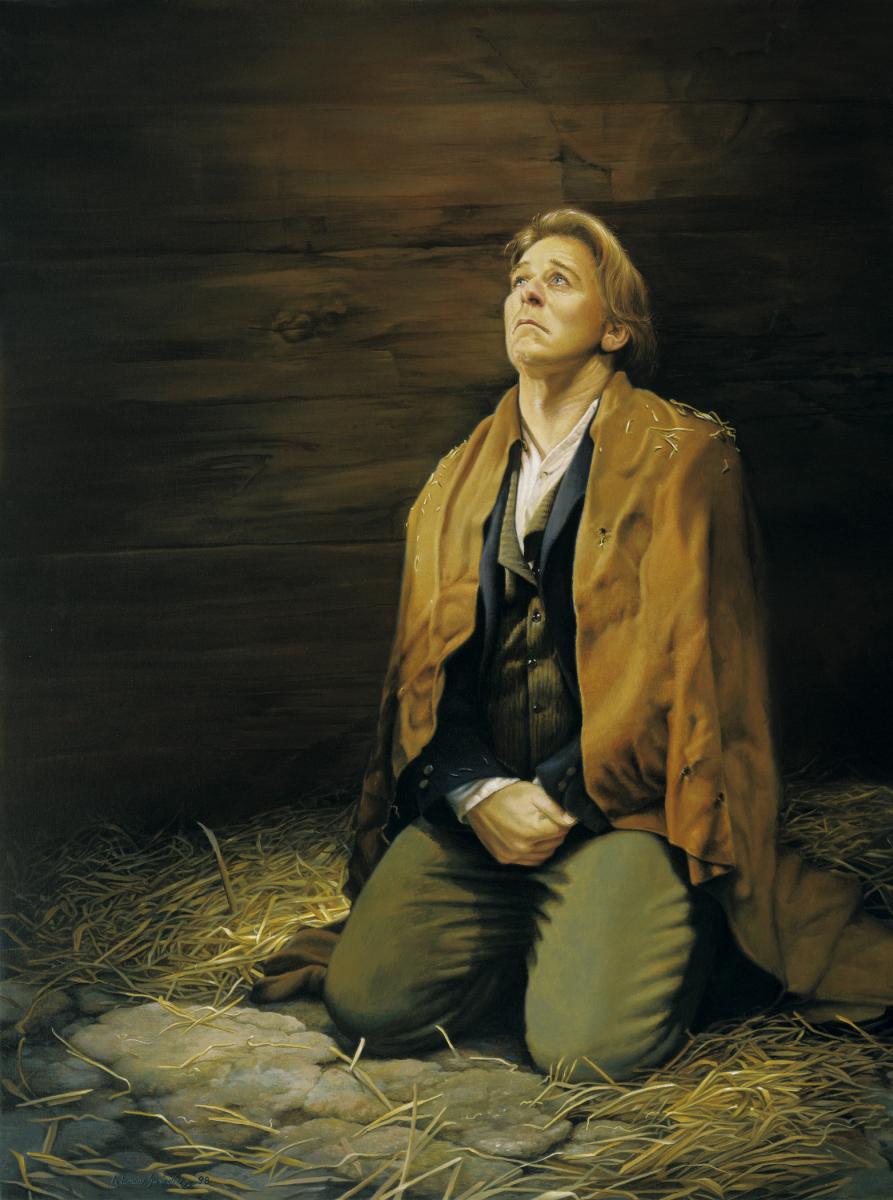 Here is a painting by Liz Lemon Swindle showing Joseph in prayer. Note the forlorn, longing look on Joseph’s face. Courtesy of Foundation Arts.
Here is a painting by Liz Lemon Swindle showing Joseph in prayer. Note the forlorn, longing look on Joseph’s face. Courtesy of Foundation Arts.
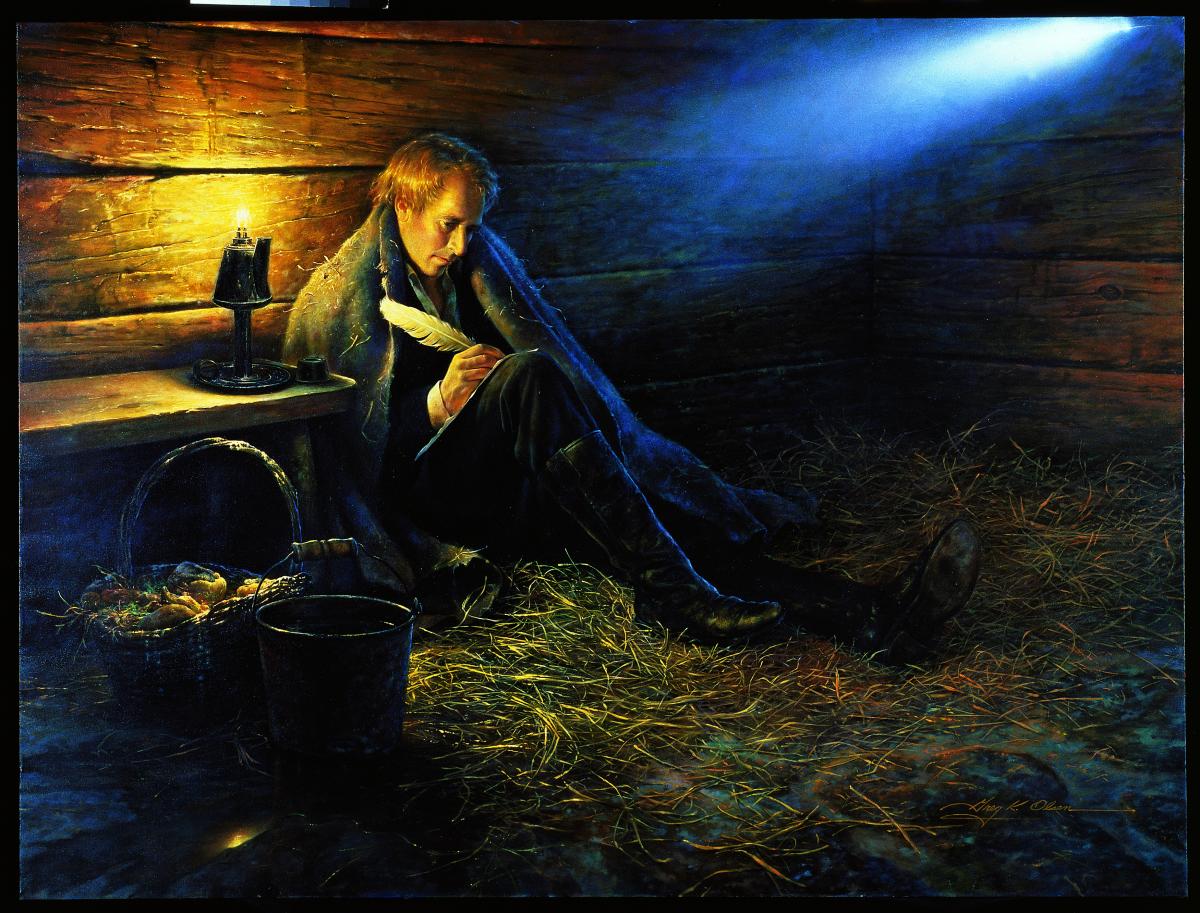 And here’s a portrayal by Greg Olsen showing how Joseph may have written some of the revelations that came during this imprisonment. Used by permission of Greg Olsen, Art Publishing, Inc.
And here’s a portrayal by Greg Olsen showing how Joseph may have written some of the revelations that came during this imprisonment. Used by permission of Greg Olsen, Art Publishing, Inc.
 2006 by Ryan Booth. All rights reserved.
2006 by Ryan Booth. All rights reserved.
A Prison-Temple Experience
Most of us, most of the time, speak of the facility at Liberty as a “jail” or a “prison”—and certainly it was that. But Elder Brigham H. Roberts, in recording the history of the Church, spoke of the facility as a temple, or, more accurately, a “prison-temple.”[8] Elder Neal A. Maxwell used the same phrasing in some of his writings.[9] Certainly it lacked the purity, the beauty, the comfort, and the cleanliness of our true temples, our dedicated temples. The speech and behavior of the guards and criminals who came there was anything but templelike. In fact, the restricting brutality and injustice of this experience at Liberty would make it seem the very antithesis of the liberating, merciful spirit of our temples and the ordinances that are performed in them. So in what sense could Liberty Jail be called a “temple”—or at least a kind of temple—in the development of Joseph Smith personally and in his role as a prophet? And what does such a title tell us about God’s love and teachings, including where and when that love and those teachings are made manifest?
As we think on these things, does it strike us that spiritual experience, revelatory experience, sacred experience can come to every one of us in all the many and varied stages and circumstances of our lives if we want it, if we hold on and pray on, and if we keep our faith strong through our difficulties? We love and cherish our dedicated temples and the essential, exalting ordinances that are performed there. We thank heaven and the presiding Brethren that more and more of them are being built, giving more and more of us greater access to them. They are truly the holiest, most sacred structures in the kingdom of God, to which we all ought to go as worthily and as often as possible.
But tonight’s message is that when you have to, you can have sacred, revelatory, profoundly instructive experience with the Lord in any situation you are in. Indeed, let me say that even a little stronger: You can have sacred, revelatory, profoundly instructive experience with the Lord in the most miserable experiences of your life—in the worst settings, while enduring the most painful injustices, when facing the most insurmountable odds and opposition you have ever faced.
Now let’s talk about those propositions for a moment. Every one of us, in one way or another, great or small, dramatic or incidental, is going to spend a little time in Liberty Jail—spiritually speaking. We will face things we do not want to face for reasons that may not have been our fault. Indeed, we may face difficult circumstances for reasons that were absolutely right and proper, reasons that came because we were trying to keep the commandments of the Lord. We may face persecution; we may endure heartache and separation from loved ones; we may be hungry and cold and forlorn. Yes, before our lives are over we may all be given a little taste of what the prophets faced often in their lives. But the lessons of the winter of 1838–39 teach us that every experience can become a redemptive experience if we remain bonded to our Father in Heaven through that difficulty. These difficult lessons teach us that man’s extremity is God’s opportunity, and if we will be humble and faithful, if we will be believing and not curse God for our problems, He can turn the unfair and inhumane and debilitating prisons of our lives into temples—or at least into a circumstance that can bring comfort and revelation, divine companionship and peace.
Let me push this just a little further. I’ve just said that hard times can happen to us. President Joseph Fielding Smith, grandnephew of the Prophet Joseph and grandson of the incarcerated Hyrum, said something even stronger than that when he dedicated the Liberty Jail Visitors’ Center in 1963. Alluding to the kind of history we’ve reviewed tonight and looking on the scene where his grandfather and granduncle were so unjustly held, he said perhaps such things have to happen—not only can they happen, perhaps they have to. Said he: “As I have read the history of those days, the days that went before and days that came after, I have reached the conclusion that the hardships, the persecution, the almost universal opposition [toward the Church at that time] were necessary. At any rate they became school teachers to our people. They helped to make [them] strong.”[10]
Lessons from Liberty Jail
Well, without trying to determine which of these kinds of experiences in our life are “mandatory” and which are “optional” but still good for us, may I suggest just a very few of the lessons learned at Liberty—those experiences that were “school teachers” to Joseph and can be to us, experiences that contribute so much to our education in mortality and our exaltation in eternity.
In selecting these lessons I note yet another kind of blessing that came out of this adversity. To make the points that I am now going to try to make in my message to you, I have drawn directly upon the revelatory words that came from the lips of Joseph Smith during this heartbreaking time, words that we now have canonized as sacred scripture in the Doctrine and Covenants. I guess we’re not supposed to have favorite scriptures, and I have enough of them that you won’t be able to pin me down to one or two, but certainly any list of my favorite scriptures would have to include those written from the darkness of Liberty Jail.
So what we instantly learn is that God was not only teaching Joseph Smith in that prison circumstance but He was teaching all of us, for generations yet to come. What a scriptural gift! And what a high price was paid for it! But how empty would our lives as Latter-day Saints be if we did not have sections 121, 122, and 123 of the Doctrine and Covenants. If you have not read them recently, I want you to read them tonight, or tomorrow at the latest—no later. That is your homework assignment, and I will be checking on you! They are contained in total on a mere six pages of text, but those six pages will touch your heart with their beauty and their power. And they will remind you that God often “moves in a mysterious way His wonders to perform.”[11] In any case, He certainly turned adversity into blessing in giving us those sacred writings and reflections, so pure, noble, and Christian in both tone and content, yet produced in such an impure, ignoble, and unchristian setting.
1. Everyone Faces Trying Times
Now then, three lessons from Liberty Jail: May I suggest that the first of these is inherent in what I’ve already said—that everyone, including (and perhaps especially) the righteous, will be called upon to face trying times. When that happens we can sometimes fear God has abandoned us, and we might be left, at least for a time, to wonder when our troubles will ever end. As individuals, as families, as communities, and as nations, probably everyone has had or will have an occasion to feel as Joseph Smith felt when he asked why such sorrow had to come and how long its darkness and damage would remain. We identify with him when he cries from the depth and discouragement of his confinement: “O God, where art thou? . . . How long shall thy hand be stayed . . . ? Yea, O Lord, how long shall [thy people] suffer . . . before . . . thy bowels be moved with compassion toward them?” (D&C 121:1–3).
That is a painful, personal cry—a cry from the heart, a spiritual loneliness we may all have occasion to feel at some time in our lives.
Perhaps you have had such moments already in your young lives. If so, I hope you have not had too many. But whenever these moments of our extremity come, we must not succumb to the fear that God has abandoned us or that He does not hear our prayers. He does hear us. He does see us. He does love us. When we are in dire circumstances and want to cry “Where art Thou?” it is imperative that we remember He is right there with us—where He has always been! We must continue to believe, continue to have faith, continue to pray and plead with heaven, even if we feel for a time our prayers are not heard and that God has somehow gone away. He is there. Our prayers are heard. And when we weep He and the angels of heaven weep with us.
When lonely, cold, hard times come, we have to endure, we have to continue, we have to persist. That was the Savior’s message in the parable of the importuning widow (see Luke 18:1–8; see also Luke 11:5–10). Keep knocking on that door. Keep pleading. In the meantime, know that God hears your cries and knows your distress. He is your Father, and you are His child.
When what has to be has been and when what lessons to be learned have been learned, it will be for us as it was for the Prophet Joseph. Just at the time he felt most alone and distant from heaven’s ear was the very time he received the wonderful ministration of the Spirit and wonderful, glorious answers that came from his Father in Heaven. Into this dismal dungeon and this depressing time, the voice of God came, saying, “My son, peace be unto thy soul; thine adversity and thine afflictions shall be but a small moment; and then, if thou endure it well, God shall exalt thee on high; thou shalt triumph over all thy foes” (D&C 121:7–8).
Even though seemingly unjust circumstances may be heaped upon us and even though unkind and unmerited things may be done to us—perhaps by those we consider enemies but also, in some cases, by those whom we thought were friends—nevertheless, through it all, God is with us. That is why we had our marvelous choir sing tonight Sarah Adams’s traditional, old Christian hymn “Nearer, My God, to Thee” with that seldom-sung fourth verse, which they sang so beautifully:
Out of my stony griefs
Bethel I’ll raise;
So by my woes to be
Nearer, my God, to thee.[12]
We are not alone in our little prisons here. When suffering, we may in fact be nearer to God than we’ve ever been in our entire lives. That knowledge can turn every such situation into a would-be temple. Regarding our earthly journey, the Lord has promised: “I will go before your face. I will be on your right hand and on your left, and my Spirit shall be in your hearts, and mine angels round about you, to bear you up” (D&C 84:88). That is an everlasting declaration of God’s love and care for us, including—and perhaps especially—in times of trouble.
2. Even the Worthy Will Suffer
Secondly, we need to realize that just because difficult things happen—sometimes unfair and seemingly unjustified things—it does not mean that we are unrighteous or that we are unworthy of blessings or that God is disappointed in us. Of course sinfulness does bring suffering, and the only answer to that behavior is repentance. But sometimes suffering comes to the righteous, too. You will recall that from the depths of Liberty Jail when Joseph was reminded that he had indeed been “cast . . . into trouble,” had passed through tribulation and been falsely accused, had been torn away from his family and cast into a pit, into the hands of murderers, nevertheless, he was to remember that the same thing had happened to the Savior of the world, and because He was triumphant, so shall we be (see D&C 122:4–7). In giving us this sober reminder of what the Savior went through, the revelation from Liberty Jail records: “The Son of Man hath descended below them all. Art thou greater than he?” (D&C 122:8).
No. Joseph was not greater than the Savior, and neither are we. And when we promise to follow the Savior, to walk in His footsteps and be His disciples, we are promising to go where that divine path leads us. And the path of salvation has always led one way or another through Gethsemane. So if the Savior faced such injustices and discouragements, such persecutions, unrighteousness, and suffering, we cannot expect that we are not going to face some of that if we still intend to call ourselves His true disciples and faithful followers. And it certainly underscores the fact that the righteous—in the Savior’s case, the personification of righteousness—can be totally worthy before God and still suffer. In fact, it ought to be a matter of great doctrinal consolation to us that Jesus, in the course of the Atonement, experienced all of the heartache and sorrow, all of the disappointments and injustices that the entire family of man had experienced and would experience from Adam and Eve to the end of the world in order that we would not have to face them so severely or so deeply. However heavy our load might be, it would be a lot heavier if the Savior had not gone that way before us and carried that burden with us and for us.
Very early in the Prophet Joseph’s ministry, the Savior taught him this doctrine. After speaking of sufferings so exquisite to feel and so hard to bear, Jesus said, “I, God, have suffered these things for all, that they [and that means you and I and everyone] might not suffer if they would repent” (D&C 19:16). In our moments of pain and trial, I guess we would shudder to think it could be worse, but the answer to that is clearly that it could be worse and it would be worse. Only through our faith and repentance and obedience to the gospel that provided the sacred Atonement is it kept from being worse.
Furthermore, we note that not only has the Savior suffered, in His case entirely innocently, but so have most of the prophets and other great men and women recorded in the scriptures. Name an Old Testament or Book of Mormon prophet, name a New Testament Apostle, name virtually any of the leaders in any dispensation, including our own, and you name someone who has had trouble.
My point? If you are having a bad day, you’ve got a lot of company—very, very good company. The best company that has ever lived.
Now, don’t misunderstand. We don’t have to look for sorrow. We don’t have to seek to be martyrs. Trouble has a way of finding us even without our looking for it. But when it is obvious that a little time in Liberty Jail waits before you (spiritually speaking), remember these first two truths taught to Joseph in that prison-temple. First, God has not forgotten you, and second, the Savior has been where you have been, allowing Him to provide for your deliverance and your comfort.
As the prophet Isaiah wrote, the Lord has “graven thee upon the palms of [His] hands,” permanently written right there in scar tissue with Roman nails as the writing instrument. Having paid that price in the suffering that They have paid for you, the Father and the Son will never forget nor forsake you in your suffering. (See Isaiah 49:14–16; see also 1 Nephi 21:14–16.) They have planned, prepared, and guaranteed your victory if you desire it, so be believing and “endure it well” (D&C 121:8). In the end it “shall be for thy good” (D&C 122:7), and you will see “everlasting dominion” flow unto you forever and ever “without compulsory means” (D&C 121:46).
3. Remain Calm, Patient, Charitable, and Forgiving
Thirdly, and tonight lastly, may I remind us all that in the midst of these difficult feelings when one could justifiably be angry or reactionary or vengeful, wanting to return an eye for an eye and a tooth for a tooth, the Lord reminds us from the Liberty Jail prison-temple that “the rights of the priesthood are inseparably connected with the powers of heaven, and that the powers of heaven cannot be controlled nor handled only [or ‘except’] upon the principles of righteousness” (D&C 121:36). Therefore, even when we face such distressing circumstances in our life and there is something in us that wants to strike out at God or man or friend or foe, we must remember that “no power or influence can or ought to be maintained [except] by persuasion, by long-suffering, by gentleness and meekness, and by love unfeigned; . . . without hypocrisy, and without guile” (D&C 121:41–42; emphasis added).
It has always been a wonderful testimony to me of the Prophet Joseph’s greatness and the greatness of all of our prophets, including and especially the Savior of the world in His magnificence, that in the midst of such distress and difficulty they could remain calm and patient, charitable and forgiving—that they could even talk that way, let alone live that way. But they could, and they did. They remembered their covenants, they disciplined themselves, and they knew that we must live the gospel at all times, not just when it is convenient and not just when things are going well. Indeed, they knew that the real test of our faith and our Christian discipleship is when things are not going smoothly. That is when we get to see what we’re made of and how strong our commitment to the gospel really is.
Surely the classic example of this is that in the most painful hours of the Crucifixion the Savior could say, “Father, forgive them; for they know not what they do” (Luke 23:34). That is a hard thing to ask when we’re hurting. That is a hard thing to do when we’ve been offended or are tired or stressed out or suffering innocently. But that is when Christian behavior may matter the most. Remember, “the powers of heaven cannot be controlled nor handled [except] upon the principles of righteousness.” And do we need the powers of heaven with us at such times! As Joseph was taught in this prison-temple, even in distress and sorrow we must “let [our] bowels . . . be full of charity towards all men . . . ; then [and only then] shall [our] confidence wax strong in the presence of God; and . . . the Holy Ghost shall be [our] constant companion” (D&C 121:45–46).
Remaining true to our Christian principles is the only way divine influence can help us. The Spirit has a near-impossible task to get through to a heart that is filled with hate or anger or vengeance or self-pity. Those are all antithetical to the Spirit of the Lord. On the other hand, the Spirit finds instant access to a heart striving to be charitable and forgiving, long-suffering and kind—principles of true discipleship. What a testimony that gospel principles are to apply at all times and in all situations and that if we strive to remain faithful, the triumph of a Christian life can never be vanquished, no matter how grim the circumstance might be. How I love the majesty of these elegant, celestial teachings taught, ironically, in such a despicable setting and time.
Do All Things Cheerfully
As a valedictory to the lessons from Liberty Jail, I refer to the last verse of the last section of these three we have been referring to tonight. In this final canonized statement of the Liberty Jail experience, the Lord says to us through His prophet, Joseph Smith, “Therefore, dearly beloved brethren [and sisters, when we are in even the most troubling of times], let us cheerfully do all things that lie in our power; and then may we stand still, with the utmost assurance, to see the salvation of God, and for his arm to be revealed” (D&C 123:17; emphasis added).
What a tremendously optimistic and faithful concluding declaration to be issued from a prison-temple! When he wrote those lines, Joseph did not know when he would be released or if he would ever be released. There was every indication that his enemies were still planning to take his life. Furthermore, his wife and children were alone, frightened, often hungry, wondering how they would fend for themselves without their husband and father. The Saints, too, were without homes and without their prophet. They were leaving Missouri, heading for Illinois, but who knew what tragedies were awaiting them there? Surely, to say it again, it was the bleakest and darkest of times.
Yet in these cold, lonely hours, Joseph says let us do all we can and do it cheerfully. And then we can justifiably turn to the Lord, wait upon His mercy, and see His arm revealed in our behalf.
What a magnificent attitude to maintain in good times or bad, in sorrow or in joy!
Blessing and Testimony
My beloved young friends, as part of my concluding testimony to you tonight, I wish to give you a blessing. It seems to me that as our apostolic witnesses are taken into the world, we have two opportunities and, indeed, perhaps obligations. One is to testify and bear witness, as I have been trying to do and will conclude in doing. The other is to bless—as the ancient Apostles did when the Savior invited them to do as He had done, except that it would be in all the world.
So for every one of you in attendance tonight—here in this vast auditorium or in other locations around the world—I bless every one of you, each one of you in your individual circumstances, as if my hands were on your head. I offer that to you as honestly as I offer my testimony. I bless you in the name of the Lord that God does love you, does hear your prayers, is at your side, and will never leave you.
I bless the brethren that you—that we—will be worthy of the priesthood we bear, that we will live true to the discipleship to which we have been called, in that great order, the Holy Priesthood, after the Order of the Son of God. I bless you that we will really be like the Master—that we will think more like He thinks, that we will talk more like He talks, and that we will do more of what He did. I bless you brethren as you strive to be faithful that you will have all the blessings of the priesthood, many of which we have quoted tonight from these very sections from the Doctrine and Covenants.
I bless the sisters within this audience and within the sound of my voice. I would have you know how much we cherish you, how much God cherishes you, and how much the flag of faith has been flown by the sisters of this Church from the beginning. In every generation, it would seem, from the beginning of time down to the present hour and beyond, so often it has been the women in our lives—our grandmothers, our mothers, our wives, our daughters, our sisters, our granddaughters—who have taken that torch of faith and that banner of beautiful living and have carried gospel principles wherever it would take them, against whatever hardship, into their own little equivalent of Liberty Jails and difficult times. Sisters, we love you and honor you and bless you. We ask that every righteous desire of your heart, tonight and forever, be answered upon your head and that you will walk away from this devotional with the understanding and the knowledge firmly in your heart as to how much God and heaven and the presiding Brethren of this Church love you and honor you.
I salute you young adults of this Church in this great CES congregation and say that the future is in your hands. Those of us of my generation have to, in the very near future, pass the baton to you. God bless you to face those times with the valor, the honesty, and the integrity we have spoken of here tonight.
In closing, I testify that the Father and the Son do live. And I testify that They are close, perhaps even closest via the Holy Spirit, when we are experiencing difficult times. I testify (and as our closing musical number, “My Kindness Shall Not Depart from Thee,” will testify, quoting the prophet Isaiah) that heaven’s kindness will never depart from you, regardless of what happens (see Isaiah 54:7–10; see also 3 Nephi 22:7–10). I testify that bad days come to an end, that faith always triumphs, and that heavenly promises are always kept. I testify that God is our Father, that Jesus is the Christ, that this is the true and living gospel—found in this, the true and living Church. I testify that President Thomas S. Monson is a prophet of God, our prophet for this hour and this day. I love him and sustain him as I know you do. In the words of the Liberty Jail prison-temple experience, my young friends, “Hold on thy way. . . . Fear not . . . , for God shall be with you forever and ever” (D&C 122:9). In the name of Jesus Christ, amen.
Notes
[1] In Joseph Smith, History of the Church of Jesus Christ of Latter-day Saints, ed. B. H. Roberts, 2nd ed. rev. (Salt Lake City: Deseret Book, 1957), 3:190–91.
[2] Alexander McRae, in B. H. Roberts, A Comprehensive History of the Church of Jesus Christ of Latter-day Saints (Salt Lake City: Deseret Book, 1957), 1:521.
[3] Smith, History of the Church, 3:290.
[4] Joseph Smith to Isaac Galland, March 22, 1839, in Personal Writings of Joseph Smith, rev. ed., comp. Dean C. Jessee (Salt Lake City: Deseret Book, 2002), 456.
[5] Joseph Smith, Letter to the Church in Caldwell County, December 16, 1838; “Communications,” Times and Seasons, April 1840, 85.
[6] Joseph Smith to Emma Smith, March 21, 1839, in Personal Writings, 449.
[7] Joseph Smith to Emma Smith, April 4, 1839, in Personal Writings, 463–64; spelling and capitalization standardized.
[8] See Roberts, Comprehensive History, 1:521 chapter heading; see also 1:526.
[9] See, for example, Neal A. Maxwell, “A Choice Seer,” Ensign, August 1986, 12.
[10] “Text of Address by Pres. Smith at Liberty Jail Rites,” Church News, September 21, 1963, 14; emphasis added.
[11] “God Moves in a Mysterious Way,” Hymns (Salt Lake City: the Church of Jesus Christ of Latter-day Saints, 1985), no. 285.
[12] “Nearer, My God, to Thee,” Hymns, no. 100.
